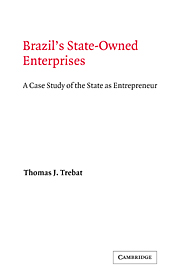Book contents
- Frontmatter
- Contents
- List of tables and figures
- Preface
- 1 Introduction
- 2 The economic role of the state
- 3 Origins of public enterprise in Brazil
- 4 The control of public enterprise in Brazil
- 5 Relationships with economic growth
- 6 Sources of growth and rates of return
- 7 Policies on pricing
- 8 The financing of public enterprise investment
- 9 Conclusions
- Appendix A Enterprises included and years covered
- Appendix B Sources and interpretation of data on public enterprises, 1965–1979
- Notes
- Selected bibliography
- Index
- Cambridge Latin American Studies
2 - The economic role of the state
Published online by Cambridge University Press: 27 March 2010
- Frontmatter
- Contents
- List of tables and figures
- Preface
- 1 Introduction
- 2 The economic role of the state
- 3 Origins of public enterprise in Brazil
- 4 The control of public enterprise in Brazil
- 5 Relationships with economic growth
- 6 Sources of growth and rates of return
- 7 Policies on pricing
- 8 The financing of public enterprise investment
- 9 Conclusions
- Appendix A Enterprises included and years covered
- Appendix B Sources and interpretation of data on public enterprises, 1965–1979
- Notes
- Selected bibliography
- Index
- Cambridge Latin American Studies
Summary
“State capitalism” in Brazil refers to the important decisionmaking role of the public sector in a supposedly free-market economy. The economic role of the Brazilian state can be broken down into two broad categories of functions: the state as a regulator of economic activity and the state as a direct participant in economic activity. The first category would include the classic allocative, stabilizing, and distributive functions of the state implemented through a variety of traditional tools: monetary, credit, and fiscal policies, trade and exchange rate policies, price controls, and so on. As a direct participant in the economy, the Brazilian state is also important as an owner of banks and enterprises. The state as regulator and the state as entrepreneur: Both of these separate, but interrelated roles of the Brazilian public sector grew in importance over the last twenty years. This book is concerned with a particular facet of state capitalism in Brazil, the nonfinancial public enterprises. But we would miss much of the subject's true importance in contemporary Brazil without at least some initial understanding of the broader role of the state as regulator and as an owner of financial institutions. The origins and major outlines of that broader role are the topics of this chapter.
Historical antecedents
Until the gold boom of the eighteenth century, the Brazilian colony was thought by the Portuguese to be of little commercial value.
- Type
- Chapter
- Information
- Brazil's State-Owned EnterprisesA Case Study of the State as Entrepreneur, pp. 10 - 29Publisher: Cambridge University PressPrint publication year: 1983



